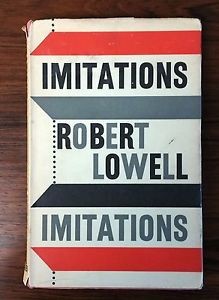Tag: c.k. williams
Will you still need me…
I was with my 5-year old grandson this weekend, and my daughter (probably for my sake) put on a Beatles playlist. I remarked to her that that song, “Will you still need me, will you still feed me when I’m 64…” was really a joke to us at the time. Who was ever going to be 64?
Then today, I happened on this prose poem by C. K. Williams:
Sixty
When I offhandedly remarked to my father how sad it was that his good friend Sol would be dying next year he startled and asked what do you mean and I answered well he’ll be sixty sixty that’s when you die everybody knows that and then my father “disabused” me– Continue reading “Will you still need me…”
Books that change your life
 I’ve been reading some essays by C.K. Williams (who wrote last week’s poem). In one essay he talks about reading a book by Robert Lowell, Imitations, which broke open a new way of thinking about poetry.
I’ve been reading some essays by C.K. Williams (who wrote last week’s poem). In one essay he talks about reading a book by Robert Lowell, Imitations, which broke open a new way of thinking about poetry.
Imitations was influential and controversial. Lowell took poems in other languages and rather than translate them, he created his own poems in English inspired by them. Many deplored this technique, finding it arrogant and disrespectful. But it definitely gave poets something to think about. For Williams, it “released something in me I hadn’t grasped had been keeping me from moving ahead in my own work.”
How amazing it is that books can crack you open, can shed light into your own struggles and world view. Continue reading “Books that change your life”
C. K. Williams
 C. K. Williams died last year. I hadn’t read much of his work, but liked what I saw in a review of his Selected Later Poems. His lines are often long, and his poems, too. This is my favorite so far. It totally grabs me in its “syrupy upsoaring netting.”
C. K. Williams died last year. I hadn’t read much of his work, but liked what I saw in a review of his Selected Later Poems. His lines are often long, and his poems, too. This is my favorite so far. It totally grabs me in its “syrupy upsoaring netting.”
At What Time on the Sabbath Do Vultures Awake?
Yesterday, at four in the afternoon there were as accurately as I could count sixteen
xxx on fence posts
and branches banking or dive-bombing might be the better term down towards a dead
xxxdeer in a gulley
but this morning at dawn there were none none at all as I trekked by so I thought
they’d consumed
the corpse or emptied its guts but no there it still was though I didn’t come too close for
xxxthe stench
then later on my way back were first five then at least a half dozen more circling over
xxxtheir quarry
a few scrolling down towards it and how not wonder whether they’d overslept or
xxxif on Sundays
like this they just like to sit around reading the paper not bothering to get up till
xxxday’s going
full blast and the great pouring clouds of chattering starlings are already in flight
xxxheading south Continue reading “C. K. Williams”